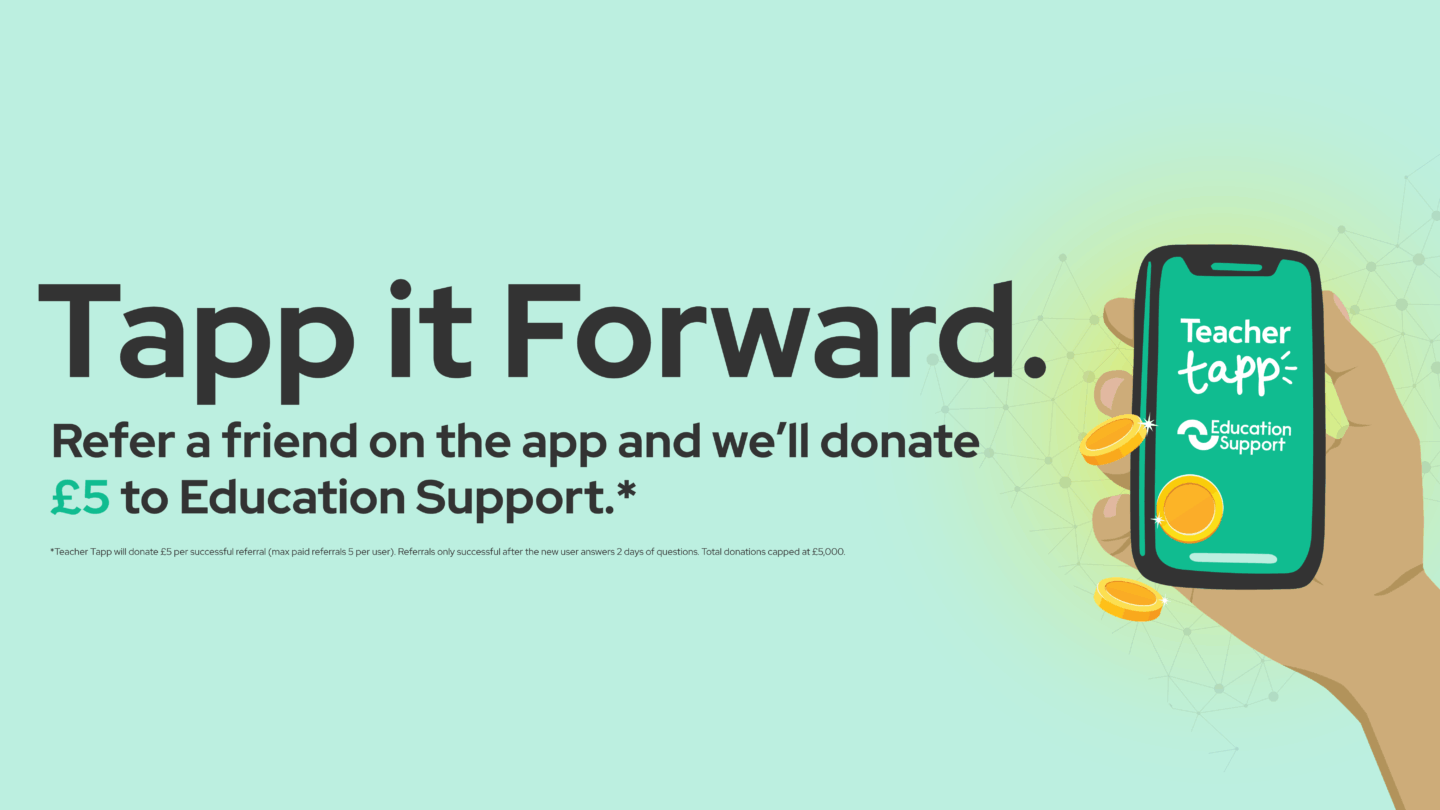Welcome Tappsters! Anyone else been doing that thing this week where they looked each day to see if the user numbers are going up? Did you do a happy dance when it hit 1,700?
Thanks for nudging people to sign up. If you want to join in, we have acolourful powerpoint (with script) or a 1-page black-and-white easy-print sheet for you to share with colleagues. Comparing Teacher Tapp answers at department meetings is a great starter activity!
This week we continued experimenting with our graphs, and as a consequence the labels along the bottom have done a switch around. If things look a bit strange at first, glare at them again. If they still look odd, let us know (email or twitter).
Right, the findings!
1.SATs on a plane (no, wait, a computer!)
This week London hosted the Education World Forum, a gathering of education ministers from across the world, followed by BETT, a 4-day migraine-inducing exhibition of technological innovations in education.
Among the chat of robots, and artificial intelligence, and ‘next generation learning’, a more prosaic tech question was on our minds. Could pupils do exams on computer rather than on paper? Teacher Tapp co-founder Laura recently mused on this and wanted to see how popular the idea is.
For SATs, 31% of teachers said they would want pupils to take SATs on computers, but 18% said additional computer facilities were needed to make it happen.

For GCSE, 39% of teachers were in favour of computerised exams, but 22% of those said additional facilities are needed.

Although ‘no’ computer exams is still the biggest group, it’s interesting that even a small number of schools are keen to go this way as it shows the potential for innovation. Toby Salt at AQA previously said the exam board is looking into computerised exams. It seems they would be pushing on an open door for some school leaders.
Thought to ponder: how would teaching need to change if pupils were sitting their exams online?
2. My exams are better than yours
Back in November we looked at the extraordinary number of teachers reporting they experienced pressure to cheat in SATs. At the time we considered the knock-on consequences for reliability of SATs, but a teacher recently challenged us to compare it with perceptions about the reliability of GCSEs.
So we did:

For SATs, more people thought the exams were not reliable than thought they were.

For GCSEs this picture reversed. More teachers thought GCSEs were reliable than thought they were not.
There are many reasons why this might be. For example, the heavy regulation of GCSEs by Ofqual, the teacher-assessed components of SATs, the fact that younger pupils are still more affected by their month of birth, and so on.
But do these raw marks mask differences between primary and secondary teachers, such that each group may feel differently about the reliability of the tests they prep pupils for?
The graph below separates the opinion of primary teachers (top row) and secondary teachers (bottom row).

Secondary teachers are much less likely to think SATs are reliable compared to primary teachers. Around half of primary teachers (49%) think they are reliable, but only around a quarter of secondary teachers feel the same (28%).
What about for GCSE?

The left-handside light green and yellow blocks represent people who think the tests are reliable. The dark red and dark green on the right are people who think the tests are not reliable.
Secondary teachers are much more positive about GCSEs than primary teachers, with 82% agreeing they are at least moderately accurate (compared to just 64% of primary teachers).
BUT notice the difference in ‘don’t know’ answers. One in five primary teachers (20%) said they ‘didn’t know’ about the reliability of GCSEs, whereas hardly any secondary teachers said the same about SATs. This makes some sense. Secondary teachers are held accountable for pupils’ progress from the point indicated by their SATs score. Reliability of primary measures therefore matters for them.
Once the ‘don’t knows’ are taken out for GCSEs, then primary teachers are only marginally less confident in the reliability of GCSEs than secondary teachers.
Overall this indicates a deep mistrust of SATs within the secondary sector, and a divided sense of confidence among primary teachers towards the tests too.
The question for everyone to ponder is: how can confidence in SATs be restored? What would it take?
3. Knock down walls? Or knock down open-plan schools?
Given many people in the education policy world were thinking about ‘the future of schools’ this week, we decided to ask a question about ‘open plan classrooms’. Do you remember those? They were a futuristic idea, once. Back in the 70s and again in the 2000s, architects and education experts had the bright idea that by having fewer walls, schools could be more ‘flexible’. Unfortunately, it has often ended badly with walls eventually (and expensively) put back in place.
But how many teachers ever experienced an open plan school?
15% of Teacher Tappers attended an open plan school, and 17% have taught in an open plan school.
We separately asked if you like the idea of open plan classrooms.
Just 8% said they liked the idea (1% strongly liked) and 12% didn’t mind either way. Majority opinion was opposed – with 41% strongly disliking the idea.

One teacher joked, ‘What’s the betting that all of the 17% who taught in the schools are also the ones who strongly dislike it’? We didn’t know, so we looked.

The bet was decent! Teachers who have taught in open-plan schools (yes) were more likely to select ‘strongly dislike’ (show in mustard yellow on the left).
But we also found quite a few advocates too, with around 18% of teachers who taught in an open-plan also liking them! What doesn’t finish you off makes you stronger, perhaps?
Teachers who attended open-plan schools also seem to remember them fondly. Almost 15% of that group strongly liked open-plan rooms, compared to only 7% of teachers who never attended an open-plan building. Does this mean open-plan is more enjoyable for pupils than teachers?
Thought to ponder: if a governor suggested taking down the walls in your schools to better emulate future working conditions, would you attempt to convince them otherwise? How?!
4. Are teachers a ‘trailing spouse’?
One of our quests at Teacher Tapp is to discover how family life interacts with working life. It’s not a topic education researchers know much about but we have a hunch it matters a lot for retention. (See this blogpost about how speed-dating might help schools on the Isle of Sheppey!)
Since asking questions about partners we’ve discovered that teachers partnered with other teachers are more positive about their work-life balance.
Next we wanted to test the ‘trailing spouse’ hypothesis, which posits the idea that teachers tend to earn less than their partners and therefore often live in places based on their other half’s job. Because of this, teachers end up spread around the country unevenly and in places located near to other professions even though there are teaching jobs everywhere.
Actually, we found that lots of teachers are the highest-earner in their family.
Only 25% of teachers had a partner who earned more than them. (An additional 11% had a partner who earned about the same).

Several teachers asked us to split down the results by gender.

The light green and yellow on the left represent the percentage of partners who earn more than the Teacher Tapper. Red is around the same. The dark green and yellow on the left shows the percentage of partners earning less.
Men are twice as likely to be the highest-earner in their family compared to women. Only 18% of men had a partner who earned a little or substantially more than they did. 38% of women were in this situation.
Half of men have a partner who earns ‘substantially’ less; only 30% of women were in this situation.
This is important to note. The ‘trailing spouse’ theory on its own is gender-neutral. Anyone can be the trailing spouse. But if women are more likely to be the trailer in earning terms it has implications for promotions.
If a job comes up in a far-flung location, it is easier to move the family when you are the highest-earner. This is particularly true if your partner earns ‘substantially’ less, as the loss of their earnings will not be as significant a dent in the family finances and can likely be gained in a job in the new location. (There are lower-paying jobs almost everywhere).
But if women are the lower-earner more often then it may limit their ability to move location, because their partners high-earning position is not replicable everywhere else. Fewer opportunities to move, means fewer opportunities they can apply for. This might be one reason why we see women getting proportionately fewer leadership positions than their numbers in the overall workforce would suggest they would get if all else was equal.
We will be coming back to this topic over time as we think it’s a key to unlocking some interesting issues around teacher retention and recruitment.
5. Ring-a-ring-a-Breaktime!
Anyone ever found themselves in this situation at the end of a lesson?
https://giphy.com/gifs/season-12-the-simpsons-12×8-3o6Mb8ncU666LP1q3m
Some mental health experts claim school bells are triggering for pupils. Some teachers love the way they provide order to the day. Others appreciate the way bells mean you don’t need a watch; while some think forcing pupils to rely on watches develops workplace skills.
Which idea is more popular? We asked users if they could open an imaginary new school, would they choose to put in school bells for transitions between classes and breaktime?

The majority (55%) went FOR school bells, but a substantial minority (40%) were AGAINST.
Could it be that people who were against quite like random, chaotic environments? We decided to look and see if the ‘no bells’ group were also the same people who liked ‘open-plan’ lessons aaaannndd… nope, there was no real difference. You were as likely to be a bells and open-plan person as a no-bells and open-plan person. Ho hum. Sometimes there just isn’t any link to be made!
Thought to ponder: If you have a school bell, why not do a school-wide experiment with no-bells for one day and see what happens? Or vice versa?
6. As ever, we learned that you really love our daily tips, so here are the links for last week:
Do teachers need to be ‘inspiring’?
Lessons learned from visiting 13 schools
What makes great pedagogy? 9 claims revisited…
Cognitive load theory summaries
Right folks – over and out for another week…
In the meantime, please keep sharing what we are doing.
Here’s the powerpoint slide (with script), a PDF, and a black-and-white one-pager to help out with that.
https://giphy.com/gifs/time-office-wzD3nQPA4gqHK
**
Enjoyed this post and want to join our Teacher Tapp panel?
Sign up via the iPhone App Store or the Android App Store.
You can also check out more at www.teachertapp.com





